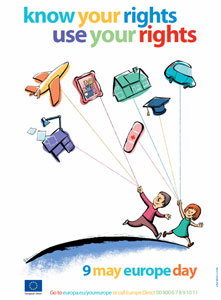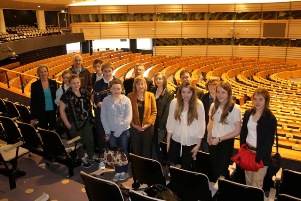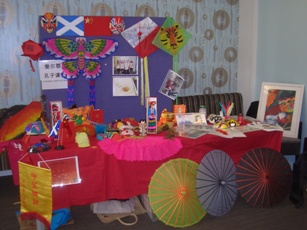

Global Citizenship blog
 Yesterday the national finals of the Euroquiz 2012 competition were held in the Scottish Parliament Debating Chamber in Edinburgh. Congratulations to St Mary’s Primary School, Duntocher, West Dunbartonshire, whose team won this year’s event; and well done to all the teams of Primary 6 pupils from around Scotland who took part in the regional heats and in the finals. The knowledge displayed by the students, and their skills in information retrieval, were very impressive for all of us who saw them in action at the various stages of the competition.
Yesterday the national finals of the Euroquiz 2012 competition were held in the Scottish Parliament Debating Chamber in Edinburgh. Congratulations to St Mary’s Primary School, Duntocher, West Dunbartonshire, whose team won this year’s event; and well done to all the teams of Primary 6 pupils from around Scotland who took part in the regional heats and in the finals. The knowledge displayed by the students, and their skills in information retrieval, were very impressive for all of us who saw them in action at the various stages of the competition.
The event was recorded by Scottish Parliament TV, and the archive video footage is now available for viewers on their website.
The Euroquiz competition has been organised annually by the Scottish European Educational Trust for some years, and continues to attract mass participation and enhance learning about aspects of the European Union.
MoreThe Global Skills Gap
Three-quarters (74%) of the 500 business leaders polled by ICM Research worried that young people’s horizons are not broad enough to operate a globalised and multicultural economy.
Employers agreed with the statement that: “Unless we better support schools to teach young people to think more globally, the UK is in danger of being left behind by emerging economies such as China, India and Brazil”. The survey conducted on behalf of the British Council and Think Global gauged the extent to which business leaders saw global thinking as an important skill amongst employees and potential recruits.
93% of businesses thought it was important for schools to help young people develop the ability to think globally. 80% said schools should be doing more; only 2% said they should be doing less. In recruiting employees, more employers (79%) said knowledge and awareness of the wider world is more important than: degree subject and classification (74%); A-level results (68%); or A-level subjects (63%).
Read The Global Skills Gap here: www.think-global.org.uk/resources/item.asp?d=6404
MoreFalkirk Council global citizenship showcase and school open day
 Venue: Bo’ness Academy, Falkirk
Venue: Bo’ness Academy, Falkirk
9:30am – 3.00pm
This event will now take place on Thursday 17th May 2012
Theme: International Education
This CPD event offers practitioners and school leaders an exciting opportunity to visit Bo’ness Academy and attend Falkirk Council’s Global Citizenship Showcase Event.
Bo’ness Academy is an inspiring example of a school that has used international education as a vehicle to engage the whole school in global citizenship activities. Through the Comenius Programme and other well established links the school has developed a rich international programme connecting it to countries across the world including: The Gambia, The Netherlands, China, France, Germany and The Czech Republic.
A focus of the event will be to identify and share the practical lessons and ideas that have helped the school move forward on its journey including:
Participants will have the opportunity to meet and talk with the Head Teacher, International Coordinator, staff and learners and also tour the classrooms and school. Time will also be set aside for participants to reflect and share their own experiences.
Following the open day event, participants will also have the opportunity to attend Falkirk Council’s Global Citizenship Showcase event which will also be taking place in Bo’ness Academy from 4pm – 6pm. This will feature exhibitions and displays from leading organisations such as Eco-Schools Scotland and the British Council and will showcase innovative global citizenship practice from many Falkirk schools.
How to book
To book, please contact Megan Farr, Policy Officer, Falkirk Council. Email: [email protected] or Tel. 01324 506671.
Places for the open day section of the event are limited so please book early to avoid disappointment. This is a free event!
Download programme for Bo’ness Academy Open Day >>
MoreOn Monday 28th November, the annual St Andrew’s Day debating championship will be held in the Scottish Parliament with students and senior pupils from universities and schools across Scotland competing in debating heats covering a range of issues important in today’s society. The Final will take place in the Debating Chamber chaired by the Presiding Officer with the opportunity to win the specially engraved Scottish Parliament Quaich. This year, for the first time, all schools across the country will be able to follow the progress of the competition on Glow throughout the day and then watch the final, streamed live on Glow TV. This is an exciting opportunity for pupils to get involved in a high quality debate and to learn more about debating.
Sign up here to follow the debate on Glow TV.
For more information on developing your own debates in school go to http://www.ltscotland.org.uk/debatinginschools/index.asp
MoreBritish Council supports schools in Scotland to make connections in Europe and globally and provide a wide variety of opportunities including accreditation and grants for CPD, exchange visits, work placements abroad and joint curriculum project work with partner schools.
The following up-coming opportunities and deadlines are opened to any school in Scotland in order to develop new and existing global connections:
Connecting Classrooms: Project with schools in the Middle East– Jordan, Lebanon, Oman, Saudi Arabia, United Arab Emirates. Deadline: 21 October
Schools with existing China school partnerships can also apply on 21 October to receive funding to develop joint curriculum work and involve students in partner visits.
For more information visit: www.britishcouncil.org/connectingclassrooms
£250 is available for staff costs, travel and subsistence to explore the idea of long term equitable partnerships with schools in Africa, Asia, Latin America and the Caribbean.
Reciprocal Visit Grants (for partnerships with Africa, Asia, Latin America and the Caribbean): 1 November- 9 January (deadline)
For more information: www.dfid.org.uk/globalschools
ETwinning and Comenius: These projects can help schools to start new partnerships projects with European partners. In-Service Training on professional development courses or job shadowing and to host Comenius Assistants in 2012. under: www.britishcouncil.org/comenius or www.etwinning.net
Online resource including partner finding and accreditation to receive recognition for schools’ global citizenship and international work is also available through www.britishcouncil.org/schoolsonline.
More Global Citizenship teaching and learning within ‘Curriculum for Excellence’ can benefit from the thoughtful, selective and informed use of Film. Many teachers will have their students watch chosen extracts or entire movies, films picked carefully which cover themes or narratives which will add to the knowledge and understanding of their students. Working with films also enables students to acquire and deepen skills in research, critical analysis and media literacy, helping them to handle different sources of information, form and communicate informed viewpoints.
Global Citizenship teaching and learning within ‘Curriculum for Excellence’ can benefit from the thoughtful, selective and informed use of Film. Many teachers will have their students watch chosen extracts or entire movies, films picked carefully which cover themes or narratives which will add to the knowledge and understanding of their students. Working with films also enables students to acquire and deepen skills in research, critical analysis and media literacy, helping them to handle different sources of information, form and communicate informed viewpoints.
In Scotland we are lucky to have a number of cinema festivals and venues which enable teachers to work with films about global citizenship issues and films from other countries which offer different and diverse viewpoints.
The Take One Action film festival begins today in Edinburgh and Glasgow and runs for the next two weeks. It offers a wide range of movies about global issues such as land, poverty, climate change, food, conflict and much more. There are documentaries and dramas, and many showings are complemented by themed audience discussions, interviews with film-makers and NGOs, etc. I’ve picked out just three of the films on offer, which may have particular use in school: ’Fezeka’s Voice‘, about an inspirational teacher and musicians from South Africa; ‘Blood in the mobile’, about child labour and mineral extraction in Congo; and ‘There once was an island’, about climate change in Polynesia. For full details of the films show dates and associated activities, check the Take One Action website.
Independent Film venues often host parts of such annual film festivals, but also run their own extensive programmes of film showings which expose teachers and students to alternative perspectives. Glasgow Film Theatre, Edinburgh’s Filmhouse, and Dundee Contemporary Arts are all active in this regard, and teachers should contact their nearest venue for advance programme details which may include special showings for schools (with associated educational elements) or teacher CPD sessions.
These independent venues are also imaginative in working with partners to develop their own festivals and seasons of films which focus on a particular theme. Two examples:
- Filmhouse hosts the ‘Africa in Motion’ festival in early November, running a series of films and events which deal with the lives and issues of young people in Africa. The films include shorts, animations, fiction and documentaries.
- The Discovery Film Festival takes place at DCA in Dundee, and its schools programme runs from 22nd October to 6th November. There are teacher CPD sessions alongside the film programme.
Many venues also take part in National Schools Film Week, which for Scotland in 2011 will be from 27th October to 4th November.
More Today is Europe Day, the annual date for celebration of the existence and activities of the European Union. Many Scottish schools work throughout the year to support student learning about Europe, taking part in initiatives such as the primary school Euroquiz
Today is Europe Day, the annual date for celebration of the existence and activities of the European Union. Many Scottish schools work throughout the year to support student learning about Europe, taking part in initiatives such as the primary school Euroquiz
This is also the month of ‘Comenius Week’, when schools celebrate the successes of intercultural dialogue achieved through the EU’s Comenius partnerships programmes. Scotland has benefitted from many Comenius school partnerships, with both bilateral and multilateral school projects, and the newer Regio programme has enabled partnership working at local authority level too.
All the major European organisations offer support to teachers who want to include a stronger European dimension to their work in schools. Three examples: the annual European Day of Languages (26th September) initiated by the Council of Europe; the education resources such as ‘Crisis Point’ produced by the European Parliament offices; and the resources such as ‘Passport to the EU’ created by the European Commission.
On this 9th May, a BBC News web story focuses on poor language skills among British people and the impact of this on their ability to win jobs with European institutions.
More Congratulations to the two students from Kings Park secondary school in Glasgow who won this year’s ‘Talk your way to Brussels’ speaking competition. This annual event is organised by the Scottish European Educational Trust (SEET), and sponsored by IBM, and requires young Scots to demonstrate their ability with a foreign language.
Congratulations to the two students from Kings Park secondary school in Glasgow who won this year’s ‘Talk your way to Brussels’ speaking competition. This annual event is organised by the Scottish European Educational Trust (SEET), and sponsored by IBM, and requires young Scots to demonstrate their ability with a foreign language.
Mark Pentleton of Radio Lingua supported the competition by training the student teams in how to make a video diary of their time at the finals in Brussels, providing participants with a download of the company’s web based language courses, and offering ipods for the winners. The finalists produced a promo video about their visit to the European Parliament with MEP David Martin.
More Lots of evidence this week that Scottish school students often develop high level skills with foreign languages and use those skills as modern young citizens of Europe.
Lots of evidence this week that Scottish school students often develop high level skills with foreign languages and use those skills as modern young citizens of Europe.
The annual secondary schools speaking competition run by the Scottish European Educational Trust has completed its regional heats and reached the last stage. It requires that participants speak on the themes of why learning a European language should matter to young people, and how language learning could be made more enjoyable. Their summing up and vote of thanks must be in a different European language. Students from five Scottish high schools will be travelling to Brussels in March to compete in the Finals at Scotland House, and will also visit the European Parliament. King’s Park Secondary, St Thomas of Aquins High School, St Margaret’s (Aberdeen), Douglas Academy and Sandwick Junior High School are the finalists.
The European Commission runs a Young Translators contest each year, with a winner in each member state. In 2011 the winning UK student is from a Scottish school, Morrison’s Academy in Crieff, Perthshire.
And finally, a group of Scottish secondary students has just returned from participating in Euroscola, a European Commission initiative which encourages collaboration among young people from across the EU. They meet in Strasbourg and discuss real issues of the day, such as the environment, using their language skills to communicate views and summarise positions with clarity. A TESS piece ‘Scots find political feet on international stage’ reports on the latest round of Euroscola, and the Euroscola Online blog describes the 2011 Scottish experience.
More A group of Education professionals from Tianjin in China is visiting Scotland this week, furthering the partnerships between Tianjin schools and Scottish secondary schools developed through the Confucius Classrooms programme managed by Learning and Teaching Scotland.
A group of Education professionals from Tianjin in China is visiting Scotland this week, furthering the partnerships between Tianjin schools and Scottish secondary schools developed through the Confucius Classrooms programme managed by Learning and Teaching Scotland.
Yesterday a LTS national China showcase event attracted around 200 staff and students to Stirling to enjoy performances and demonstrations of Scottish classroom activity related to Chinese culture and language. Each of the Confucius Classroom regional hubs in Scotland also displayed material and shared their experience of curricular work.
An article in The Herald ‘Let young Scots learn Mandarin, Confucius says’ reports on the visit and the importance of international partnership working in Education.
A LTS press release gives background details.
More
Find us on